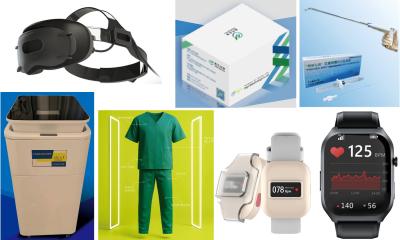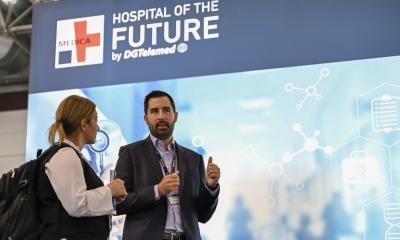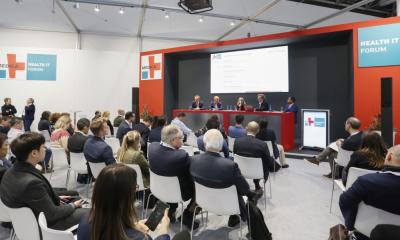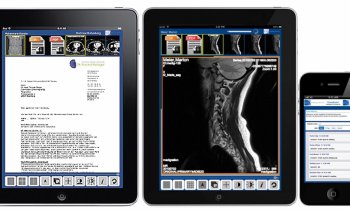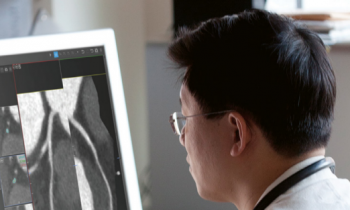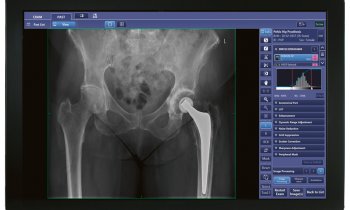Photo: Messe Düsseldorf
News • New ideas
MEDICA becomes number one trade fair for health start-ups
Healthcare is going digital worldwide at an incredibly rapid pace. More and more applications for prevention, diagnostics and therapy are being made into apps (with matching hardware) for smartphones and tablets or are even available as wearables for direct use on the body.
Digitalisation is also striding forward in Germany, where doctors, therapists and patients still take a fairly analogue approach in comparison to the rest of the world. Indeed, people with health insurance may even be entitled to digital applications now. This is stated in the German Digital Care Act (DVG). A draft of this act will be introduced in the Bundestag (German Federal Parliament) and the Bundesrat (Federal Council of Germany) soon.
An overview of the benefits that digital health applications and their paired medical technology are already providing will be offered by the world-leading medical trade fair MEDICA once again, which has over 5,100 exhibitors from almost 70 countries. This year, MEDICA will take place in Düsseldorf from 18 to 21 November. Start-ups are given special attention here. The number of start-ups at MEDICA has consistently increased over the past few years. Now, several hundred of these very young and mostly digitally driven companies come here to meet their international specialist audience and present their ideas and sparkling new innovations to them. Visitors should jot the MEDICA Disrupt pitches down in their diaries to ensure that they get a look at these innovative start-ups and their creative ideas. These will take place within the scope of the MEDICA Connected Healthcare Forum, and more particularly in the MEDICA Start-Up Park (both in Hall 13).
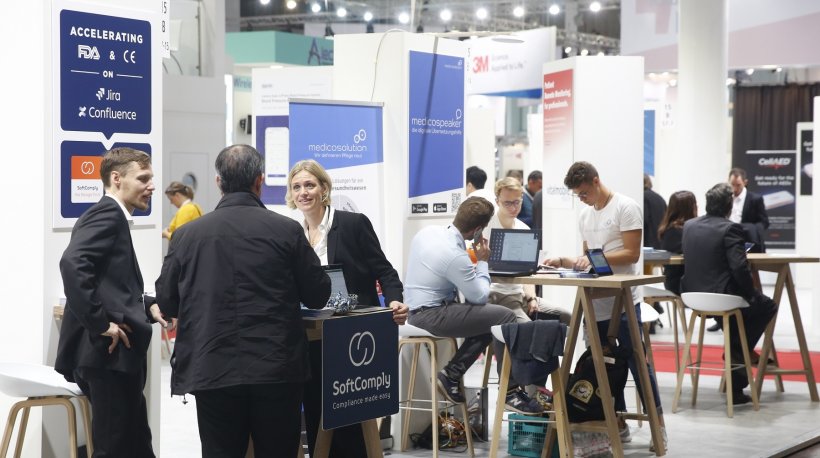
Photo: Messe Düsseldorf
A pioneering program at MEDICA Disrupt
At MEDICA Disrupt, exciting finals are on the program in the first two days of MEDICA, with each final involving 10 start-ups. On Monday, the 11th Innovation World Cup looks at healthcare solutions in the IoT (Internet of Things). The world’s best health app is sought out in the 8th MEDICA App Competition on Tuesday. The participants in these pitches finals will try to win over the international jury and secure their ticket for the live presentations at MEDICA 2019 from among hundreds of applicants.
These two finals are not the only events that visitors should be focusing on. There’s also a pioneering program to take in at MEDICA Disrupt. From 3:00 pm on Monday 18 November, we’ll take a look at body augmentation: the optimization of the human body using robotics, 3D printing and intelligent implants. One participant here is the start-up Ebenbuild. Dr. Kei W. Müller (CEO) has been performing research for a project that aims to provide patients with acute respiratory distress syndrome (ARDS) with individually tailored mechanical ventilation settings for their ventilators in order to improve their chances of survival and recovery. He has been working on this for twelve years. Up until now, ventilators could only be adjusted to patients in a very limited manner by inputting body parameters that tend to be imprecise (e.g. weight). Ebenbuild wants to change that using software that uses CT scanning and machine learning to produce a virtual patient-specific model of the lungs, thus creating a digital model (a digital twin) of them. This enables automated, personalised and precise prediction of optimal ventilation for that patient.
A prototype for this is already available and will be tested over the next three years. Naturally, like most start ups, Ebenbuild is seeking other development partners. Ultimately, they believe that software-based digital twins like this one will not only change the development processes for medicines and medical products but will also lay the groundwork for a new class of diagnostic and monitoring tools. If you want to learn more about digital twins, a session titled “How Digital Twins will improve healthcare for their real-world counterparts” will be held in the MEDICA Health IT Forum (also in Hall 13) on the following day.
Recommended article
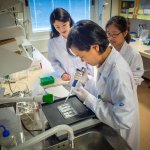
News • Personalised medicine
Why digital twins could be the ideal therapy testbed
Advanced computer models of diseases can be used to improve diagnosis and treatment. The goal is to develop the models to “digital twins” of individual patients. Those twins may help to computationally identify and try the best medication, before actually treating a patient. The models are the result of an international study, published in the open access journal Genome Medicine.
Making diagnostics more comfortable
On Wednesday 20 November, be sure to attend the MEDICA Disrupt session on the topics of diagnostics and health monitoring, held from 1:00 pm. One participant in this session is Vitascale. This company is looking to make spiroergometry a more pleasant experience for the patient via a novel headset which is set to replace the usual mask and mouthpiece which has been prevalent up until now. The headset measures expiratory oxygen, respiratory volume and the pulse. An app calculates personal fitness, fat burned and the basal metabolic rate. The patented system enables users to analyse their performance without a mask and provides coaching to optimize the individual’s weight and performance with a precision that, up until now, could only be obtained using expensive and cumbersome medical devices. 13 other start-ups will also present innovative solutions for measuring blood pressure, lab-on-skin technology and biomarker analysis, among other items, in this session.
The subsequent MEDICA Disrupt session is dedicated to women’s health. Here, the start-up viMUM shows how modern antenatal prep for parents could look using e-learning modules that can be called up in an app. The viMUM experts consist of midwives, gynaecologists, paediatricians, psychologists and dietitians who provide qualified support to expectant parents when they are called on. Other start-ups in this Wednesday session show breastfeeding apps, a smart wireless stethoscope for babies and children and a wireless cardiotocography system (iCTG) for monitoring foetal wellbeing.
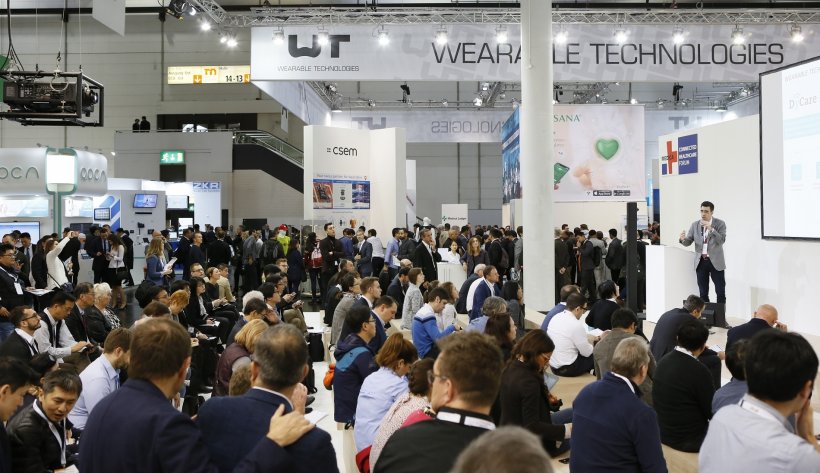
Photo: Messe Düsseldorf
Cognitive and mental health prove a strong field for growth
The MEDICA Disrupt session held at 11:00 am on Thursday 21 November is dedicated to cognitive and mental health. Michele Maltese, CEO and co-founder of Avanix, will present a modern system for monitoring patients with Alzheimer’s, among other elements. OiX Care enables professional carers to monitor Alzheimer’s patients round the clock. The system consists of a transmitter (OiX Sensor) which is worn by the patient and a receiver (OiX Receiver) that enables the carer to monitor the person. OiX communicates in real time through an ISM radiofrequency protocol. The device does not require a telephone or network connection to transfer information from the patient to the carer, and has a range of 200 metres indoors and three kilometres outdoors.
The “Mindance” app, on the other hand, focuses on increasing wellbeing by functioning as a personal assistant, providing meditations, relaxation exercises and applying the latest findings from the world of psychology. All of this is united in one app that would be perfectly suited to companies, where it could be used to boost occupational health. Employees could, for example, be given personalised mental training via the app. Robin Maier, CEO and founder, will explain how this concept could work in more detail.
Treating chronic conditions using new methods
Following this, the future for treating chronic illnesses will be illuminated at MEDICA Disrupt. Start-ups will show innovations for treating high blood pressure and other cardiovascular conditions via non-invasive measurement of blood glucose, ranging from glaucoma to chronic pain. Using light is a big theme here. The CareWear light patch produces blue and red light in order to relieve pain and improve tissue regeneration by boosting local blood circulation and elevating the tissue temperature. The light patches emit wavelengths of light that warm tissues. This makes the muscles relax and stimulates circulation. The CareWear light patches are wireless and are easy to use. They will be presented at MEDICA by Dr. Chris Castel (CEO).
Further sessions on MEDICA’s closing day (21 November) will revolve around artificial intelligence (AI), big data and how AI is used to classify and document ulcers and wounds.
While the MEDICA Disrupt sessions offer start-ups a stage for speakers and their entertaining presentations, the MEDICA Start-Up Park in Hall 13 is set up to be a fixed meeting point throughout the entire run of the trade fair, ensuring that contact can be made with these young companies who are headed for success, and to provide a platform for discussing their creative product concepts. Last year’s winner of the Innovation World Cup (in the healthcare category), the start-up StethoMe, registered to take part in the fully-booked up MEDICA Start-Up Park in time and will be participating. StethoMe offers a wireless stethoscope which lets parents check their children’s lung and heart function quickly themselves and share the data with a doctor via an app.
In November, the month of the trade fair, it’s certain that flu season will already have taken hold. A wrong diagnosis and negligent treatment can lead to dangerous complications for a few cases, such as lung infections and bronchitis. The Polish development team from SensDx, who will also be present at the MEDICA Start-Up Park, also wants to prevent this via its software and hardware applications. A multi-sensor which enables a quick test to be carried out to diagnose infections of the upper respiratory tract is part of this. Using it is very easy. A swab sample is taken which is then placed in a solution contained in a capsule and then put a compact measuring device. The sensor can detect a flu virus in its early stages, which is very important in enabling the doctor to select the correct therapy and preventing unnecessary prescriptions of antibiotics, as antibiotics simply don’t work on viral infections.
Rehago, from Reutlingen University, is a German start-up that will also be presenting at the MEDICA Start-Up Park. Rehago specialises in virtual reality applications that can be used as a training activity in rehabilitation of hemiplegic patients, patients with muscular spasms or hemispatial neglect (an attention disorder caused by brain lesions).
Intento, a Swiss company, is also active in the rehabilitation field. At MEDICA 2019, Intento will present an easy-to-use application that aids patients who have been severely paralysed by strokes in recovering the motor function in their upper limbs. The solution revolves around functional electrical stimulation and requires no prior knowledge on how to place electrodes or time-consuming steps to configure the system, unlike other solutions on the market. The rehabilitation application from Intento consists of a tablet application for therapists and a device for controlling movement (for the patient) that is linked to an electrical stimulator.
A total of over 30 start-ups will participate in the MEDICA Start-Up Park. Six of them benefit from the support provided by the Merck Group’s global accelerator programme. This science and technology company, predominantly driven by research, is based in Darmstadt and supports start-ups with the objective of entering into a partnership with them. Besides funding, the Merck Group offers access to the facilities and venues at the Merck Innovation Center as well as the opportunity to join a network of over 50,000 experts and alumni in 67 countries.
Source: Messe Düsseldorf
11.09.2019



